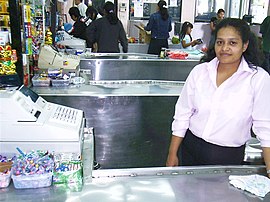|
Cashier A retail cashier or simply a cashier is a person who handles the cash register at various locations such as the point of sale in a retail store. The most common use of the title is in the retail industry, but this job title is also used in the context of accountancy for the person responsible for receiving and disbursing money or within branch banking in the United Kingdom for the job known in the United States as a bank teller. Retail In a shop, a cashier (or checkout operator) is an employee who scans the goods through a cash register, that the customer wishes to purchase. In most modern stores, the items are scanned by a barcode positioned on the item with the use of a laser scanner. After all of the items have been scanned, the cashier then collects the payment (in cash, check, and/or by credit/debit card) for the goods or services exchanged, records the amount received, makes change, and issues receipts or tickets to customers. Cashiers will record amounts received and may prepare reports of transactions, reads and record totals shown on cash register tape and verify against cash on hand. A cashier may be required to know value and features of items for which money is received; may cash checks; may give cash refunds or issue credit memorandums to customers for returned merchandise; and may operate ticket-dispensing machines and the like. In one form or another, cashiers have been around for thousands of years. In many businesses, such as grocery stores, the cashier is considered a "stepping stone" position. Many employers require employees to be cashiers in order to move up to customer service or other positions. Cashiers are at risk of repetitive strain injuries due to the repeated movements often necessary to do the job, such as entering information on a keypad, moving product over a scanner, and standing on one's feet for several hours. DemographicsIn the United States, the majority of cashiers are women. According to Fox Business, as of 2016, an estimated 70% of cashiers are female.[1] Job outlookIn the United States, the employed number of cashiers is expected to decline. From 2023 to 2033, the Bureau of Labor Statistics expects an 11% job outlook decline.[2] SalaryIn 2022, the median salary in the United States for a cashier was $28,240.[3] Alternative types of cashiersAccountancyA less-current meaning of the term referred responsible for receiving and disbursing money in a business. In a non-retail business, this would be a position of significant responsibility. With an ever-larger proportion of transactions being done using cash substitutes (such as checks, credit cards, and debit cards), the amount of cash handled by such employees has declined, and this usage of the word "cashier" has been largely supplanted by the title comptroller. Retail bankingIn a bank branch in the United Kingdom, a cashier is someone who enables customers to interact with their accounts, such as by accepting and disbursing money and accepting checks. In the United States, the job title is bank teller. Virtual cashierVirtual cashiers are professionals who manage point-of-sale interactions remotely via live digital interfaces, replacing the traditional in-person role.[4] Percy introduced this concept in Canada which became controversial.[4][5] Notable cashiersMany notable public figures have worked as cashiers, typically before beginning gaining public notoriety. However, several have chosen to work as cashiers during or after their public careers.
Fictional cashiers
See alsoReferences
External linksLook up cashier in Wiktionary, the free dictionary. Wikimedia Commons has media related to Cashiers. |